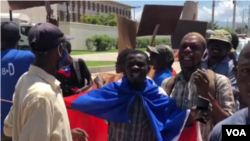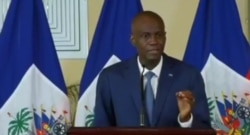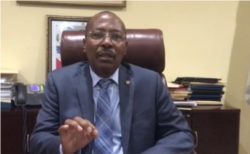U.S. Secretary of State Mike Pompeo is calling on Haiti's government to hold legislative elections "as soon as technically feasible."
"Haiti's legislative elections are now overdue. We continue to call for elections as soon as technically feasible. We understand that the OAS secretary-general has called for those elections to be held by the end of January," Pompeo said in a video clip posted on Twitter.
Haitian President Jovenel Moise announced the formation of a new provisional electoral council (Conseille Electoral Provisoire, CEP) on Sept. 22 and presided over the swearing in of its nine members. In a message posted on Twitter, Moise thanked the members for their willingness to serve the nation at a "difficult time."
"Your country is grateful for your courage," Moise tweeted.
The new CEP is charged with organizing elections.
Questions about CEP legitimacy
But Haiti's opposition rejects the council's legitimacy and refused to participate in the process to select its members.
In an interview with VOA Creole, Haitian Senate President Pierre Francois Sildor, a member of the ruling PHTK (Pati Ayisyen Tet Kale) party, said the president's new electoral council does not meet the strict standards set forth in Article 289 of Haiti's constitution, which stipulates which sectors of society must be represented.
"What it (the constitution) says is what must be done,” the senator said. “It says there must be a representative from the executive branch – the executive did not name a representative. It says there must be a representative of the Episcopal Conference – the Catholic church and other religious sectors did not name a representative. It requires a representative of the universities – there isn't one. It requires a union representative – they didn't name one – these are four huge sectors of society – everyone knows that – and they are not represented."
Residents of Haiti’s capital, Port-au-Prince, interviewed by VOA Creole shortly after the CEP swearing-in ceremony in September, opposed the idea of holding elections.
"This president thinks he can rule unilaterally, but we'd like to remind him he needs to consult the people (before making these decisions)," a man who declined to give his name said.
"We are dealing with insecurity, we have no customers, no cash flowing in – forget about elections, Jovenel Moise needs to understand we need security first," a female merchant at an open-air market told VOA.
"People are dying in the streets, we don't have food to eat, and you're talking about elections?" a male customer at an open-air market said. "Jovenel Moise cannot hold elections.”
OAS expresses concern about Haiti
In May 2020, the Organization of American States Secretary General Luis Almagro issued a statement on Haiti's political situation, which highlighted the importance of elections.
"As established by the founding documents of the Inter-American system, legitimate governments are produced only by free and fair elections," the statement said.
The OAS also called on all political actors to participate in the process.
"The OAS General Secretariat urges all political forces in Haiti to find a cooperative framework in order to comply with the letter and the spirit of their constitutional order, respecting the five-year presidential term in office. In this context, the term of President Jovenel Moïse ends on February 7, 2022," the statement said.
The comment was greeted with anger and pushback from Haiti's opposition and human rights leaders who accused Almagro of meddling in Haiti's internal affairs. They also disputed the date that Moise's term ends.
Ruling by decree
Moise has been ruling by presidential decree since January 2020 because the Parliament is out of session. The terms of two-thirds of the Chamber of Deputies and Senate expired months before the pandemic hit in March.
According to officials, parliamentary elections have not been held because of the insecurity caused by a series of anti-corruption protests that sometimes turned deadly, roiling the nation, crippling the economy and creating a climate of insecurity during most of 2019. The situation has been exacerbated by the coronavirus pandemic.
Presidential adviser Patrick Crispin announced on June 23 that legislative elections are planned for December 2020. In the meantime, there have been no parliamentary checks and balances on the president’s decrees.
Leadership vacuum
Failure to hold elections before Moise's term ends would leave Haiti in a leadership vacuum. The opposition has floated the idea of a "transitional government" to rule the country in the meantime, but after countless meetings, they have failed to agree on much of anything.
"A transitional government should organize elections because we cannot campaign for office, the political climate is not conducive at this time," an opposition leader told VOA Creole.
Anti-US protest
On Sept. 24, the opposition held a small protest in front of the U.S. Embassy in Port-au-Prince, during which protesters chanted, "In this climate of insecurity we will not participate in elections!"
"We ... Haitians want Americans to know that although they are threatening sanctions against those of us who stand against this illegitimate (electoral) council, we're not afraid," a protest leader told VOA Creole. "There will be no election as long as Jovenel Moise is in power. The United States has no authority to order us around."
The opposition announced nationwide protests on Oct. 17, a national holiday honoring the life of Jean Jacques Dessalines, one of the nation's founders and a hero of the revolutionary war for independence. They say they will be calling on Moise to resign.
In Port-au-Prince, VOA Creole’s Renan Toussaint, Matiado Vilme and Yves Manuel contributed to this report.







